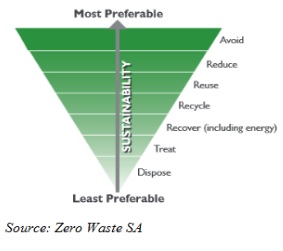
Recycling Right in South Australia
Recycling in South Australia is serious business. In fact, of all the states and territories in Australia, South Australia is known to have the highest percentage, at 76.5%, of waste being recycled or composted. That's the equivalent of 2,410 kg of recycled material per capita. With statistics like this, it isn't surprising that South Australia is actually recognized as one of the world's leaders when it comes to waste management.
The benefits of responsible waste management extend beyond simply diverting waste from a landfill. According to the Annual Report of South Australia's Zero Waste agency, a government agency dedicated to waste management, recycling actions have contributed a total direct market value of $313 million, an equivalent of $79 per tonne of resources recovered. Additionally, this enormous amount of waste diverted from landfills contributed to a total of 1.28 million tonnes of carbon dioxide from being emitted into the atmosphere. That's tantamount to taking 269,474 cars off the road.
Finally, there are energy recovery benefits to recycling. Energy recovery is defined as 'processes or opportunities to recover energy from waste materials, usually through thermal processes' according to Australia's Department of Sustainability, Environment, Water, Population and Communities' Waste and Recycling in Australia 2011 Report. To illustrate, it takes only 60-70% of the energy normally required to produce paper from virgin materials when using recycled paper pulp instead. The energy recovered from the recycled material translates into economic and greenhouse gas emissions savings.
South Australia's Strategic Plan includes state-wide goals to improve the well-being of citizens living within the jurisdiction. For the area of Waste Management, the state aims to reduce waste to the landfill by 35% by 2020, with a milestone goal of achieving 25% by 2014. Zero Waste South Australia (SA) is the government agency primarily responsible for overseeing the progress and achievement of this objective. In doing so, the agency uses the waste hierarchy shown at right as their guidepost for responsible and effective waste management. This system truly goes beyond the traditional three R's (reduce, reuse, recycle) and encourages environmentally sustainable behaviours.
So how does Australia, and South Australia in particular, achieve the impressive results it does? The answer is a comprehensive mix of government policies, citizen education and engagement, the development of infrastructure, technologies and support programs as well as collaborating with the private sector for voluntary improvement. Examples of these measures include:
- the creation of Zero Waste SA,
- the ban on plastic bags at check-out stations,
- increasing container deposits to 10 cents in 2008,
- conducting pilots projects within the municipal sector to identify how behaviour change can come about effectively,
- improving the controls surrounding illegal dumping and unauthorized stockpiling,
- instigating behaviour change through educational signage on general waste bins,
- establishing effective support programs such as the Zero Waste SA Grants Program, the TV Recycling Program and the Resource Efficiency Assistance Program,
- and many, many other initiatives.
One program of particular interest is the Recycle Right at Work initiative. Aimed at waste disposal companies with rubbish removal services in Adelaide, funds are provided to help these companies offer improved services to small and medium sized businesses to encourage responsible waste management behaviour.
Behaviour change is one of the most challenging aspects that waste and recycling professionals contend with. There tend to be more opportunities for waste reduction through the construction and demolition industries because fewer people make the decision to recycle or not and there is a clearer financial incentives to responsible waste management practices (for example using industrial and commercial waste bins that will be sorted through to have recyclable materials recovered). It is far easier to educate a small number of people than it is to educate and change a larger population.
Over the past three decades, behavioural psychologists have been studying human behaviours with respect to recycling. Some key findings in that research are that waste bin type matters when it comes to curbside waste collection. Terraced houses, for example, which often have storage and access issues do better when they are given general waste bins. However, houses with driveways have higher recycling rates if they are given waste bins with wheels. It has also been proven that frequency of waste collection also has its impact. One good strategy that municipalities around the world are adopting is to collect general waste one week and recyclables the next week. By alternating in this fashion, recycling is seen as a major part of the waste system, rather than simply an add-on.
Zero Waste SA's programs and initiatives use many of the lessons learned by academics regarding successful waste collection. A critical success factor is the thorough stakeholder involvement that Zero Waste SA undertakes to allow its many programs and initiatives to succeed. By taking the complex problem of waste management, through all of its various streams and diverse set of stakeholders, and tackling each waste stream in a focused, tailored manner that South Australia achieves its truly impressive waste management targets.




